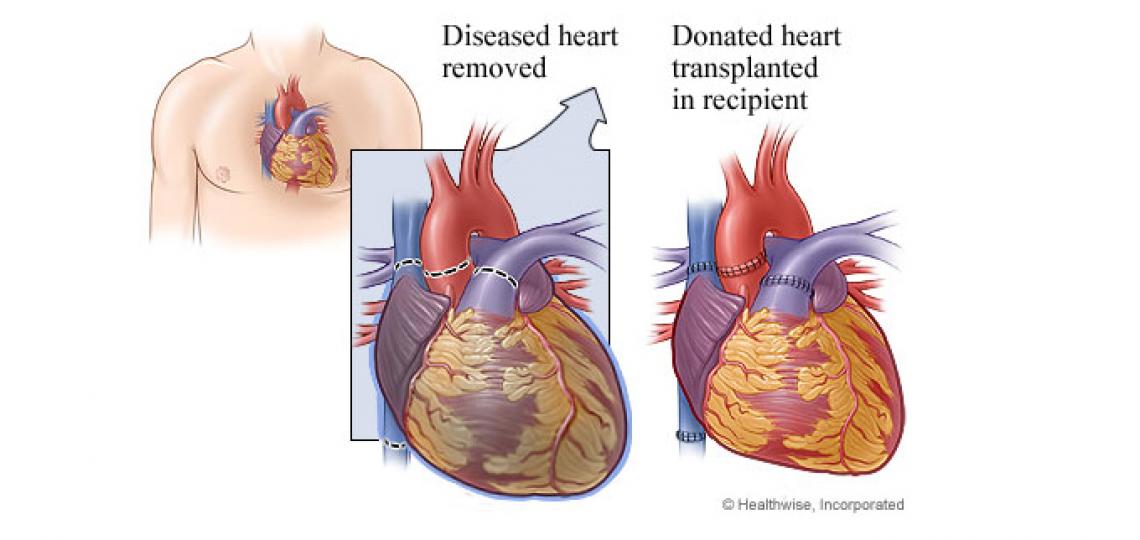
Overview
A heart transplant is surgery to take out a diseased heart and replace it with a donor heart.
The doctor will make a cut in the skin over your breastbone (sternum). The cut is called an incision. Then the doctor will cut through your sternum to reach your heart. During the surgery, a pump moves blood through your body. This is done while the doctor takes out the diseased heart and puts in a healthy heart from someone who has died.
The doctor will use wire to put your sternum back together. Stitches or staples are used to close the incisions in the skin over your sternum. The wire will stay in your chest. The incisions will leave scars. But the scars may fade with time.
You will spend about 1 to 2 weeks in the hospital after surgery. You may have to stay longer. This depends on your health and if you have problems from surgery.
You will likely start a cardiac rehabilitation (rehab) program in the hospital. You will continue with this rehab program after you go home to help you recover and prevent problems with your heart.
You probably will feel better each day. But it may take a few months to get your energy back.
What happens on the day of your heart transplant surgery?
Follow the instructions exactly about when to stop eating and drinking. If you don’t, your surgery may be canceled.
- If your doctor told you to take your medicines on the day of surgery, take them with only a sip of water.
- Take a bath or shower before you come in for your surgery.
- Do not apply lotions, perfumes, deodorants, or nail polish.
- Do not shave the surgical site yourself.
- Take off all jewelry and piercings. And take out contact lenses, if you wear them.
At the hospital or surgery center
Bring a picture ID.
You will be kept comfortable and safe by your anesthesia provider. You will be asleep during the surgery.
The surgery will take at least 4 hours.You will have a breathing tube down your throat. This is usually removed within 6 hours after surgery. You will not be able to talk or drink liquids while the tube is in your throat. After the tube is removed, your throat will feel dry and scratchy. Your nurse will tell you when it is safe to drink liquids again.
You will have a thin plastic tube, called a catheter, in a vein in your neck. It is used to keep track of how well your heart is working. This is usually removed in 1 to 3 days.You will have chest tubes to drain fluid and blood after surgery. The fluid and extra blood are normal and usually last only a few days. The chest tubes are usually removed in 1 or 2 days.
You will have several thin wires coming out of your chest near your incision. These wires can help keep your heartbeat steady after surgery. They will be removed before you go home.
What can you expect after a heart transplant?
After a heart transplant, the recovery process is similar to the process after other heart surgeries.
You will spend about 1 to 2 weeks in the hospital after surgery. You may have to stay longer depending on your health and if you have complications from surgery. While in the hospital, you will start a cardiac rehabilitation program. And your doctors will check on your heart to make sure your body isn't rejecting it.
Cardiac rehabilitation
A cardiac rehab program can help you recover from your surgery and be active again.
Your transplanted heart will respond to activity a little differently. Your heart rate will not increase like it used to. And you will have a higher resting heart rate. This is because some of the nerves that control your heart were cut during your surgery.
After a heart transplant, you must follow a strict lifestyle involving daily medicines and regular medical care, which includes regular sampling (biopsies) of the transplanted heart tissue to check for rejection.
What happens when you go home after heart transplant surgery?
Be sure you have someone to drive you home. Anesthesia and pain medicine make it unsafe for you to drive.You will be given more specific instructions about recovering from your surgery. They will cover things like diet, wound care, follow-up care, driving, and getting back to your normal routine.
© 2016-2019 Healthwise, Incorporated.








